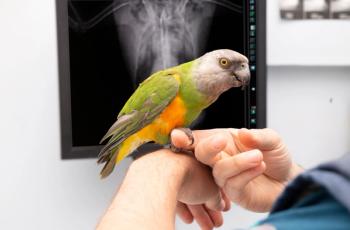
The Use of Fecal Transplantation to Treat Canine Parvovirus Infection
In a recent study, incorporating transplantation with standard supportive care decreased mortality rate and hospitalization time.
Canine parvovirus (CPV) infection can cause high mortality in young dogs, especially if left untreated. The virus damages crypt cells of the intestinal microvilli, resulting in increased permeability of the gut and hemorrhagic diarrhea.
The use of various therapies, such as
RELATED:
- Canine Parvovirus Infection and Long-Term Health
- What Diseases Are Preventable with Proper Disinfection?
Fecal microbial transplantation (FMT) from healthy donors has been used to treat human patients with chronic Clostridium difficile infection, and similar concepts in veterinary medicine (such as rumen transfaunation in cattle) date back to the 1700s.
Researchers in Brazil recently performed
Study Design
Dogs younger than 1 year that were suffering from acute hemorrhagic diarrhea syndrome were admitted to 2 veterinary teaching hospitals in Brazil. Bloodwork, fecal parasitologic exam, and CPV testing were performed for all patients at the time of admission, and physical exam was performed daily during hospitalization.
Patients received either standard supportive treatment (STD) or STD with the addition of FMT. STD was initiated at the time of admission and consisted of IV fluid therapy and antibiotics, as well as an injectable antiemetic and a gastric protectant.
A healthy adult American pit bull terrier living in the hospital kennel served as the FMT donor. The dog was current on vaccinations and deworming, had normal bloodwork and fecal parasitology, and was negative for CPV, canine distemper virus, and Ehrlichia canis. Voided feces were collected daily over a 2-week period, aliquoted, and frozen to ensure all FMT patients received similar microbiota samples.
For FMT, 10 g of feces was diluted in 10 mL of dilute saline and administered into the proximal rectum using a syringe and urethral catheter. Afterward, patients remained laterally recumbent with the pelvis elevated for 2 minutes. Patients were not restrained, sedated, or anesthetized for the procedure. FMT was performed 6 to 12 hours after admission and every 48 hours thereafter for up to 5 applications or until diarrhea resolved.
Results
A total of 33 STD and 33 STD+FMT dogs tested CPV-positive and were treated between July 2015 and August 2016. Body weight and bloodwork results were statistically similar between treatment groups, although puppies receiving STD+FMT had a higher median age than those receiving STD alone (4.0 vs 3.0 months).
Major findings were as follows:
- Mortality rate was lower for dogs that received STD+FMT (21.2%) than for dogs treated with STD alone (36.5%).
- Diarrhea resolved within 48 hours of hospitalization for 61.5% of patients receiving STD+FMT, compared with 4.8% of STD patients.
- Average hospitalization time was significantly shorter for dogs in the STD+FMT group than for those in the STD group (3.3 vs 6.0 days).
Take-home Message
The authors deemed FMT a safe procedure with no adverse effects. The addition of FMT to STD decreased mortality rate and average recovery time for puppies with CPV infection.
Dr. Stilwell received her DVM from Auburn University, followed by an MS in Fisheries and Aquatic Sciences and a PhD in Veterinary Medical Sciences from the University of Florida. She provides freelance medical writing and aquatic veterinary consulting services through her business, Seastar Communications and Consulting.
Newsletter
From exam room tips to practice management insights, get trusted veterinary news delivered straight to your inbox—subscribe to dvm360.




